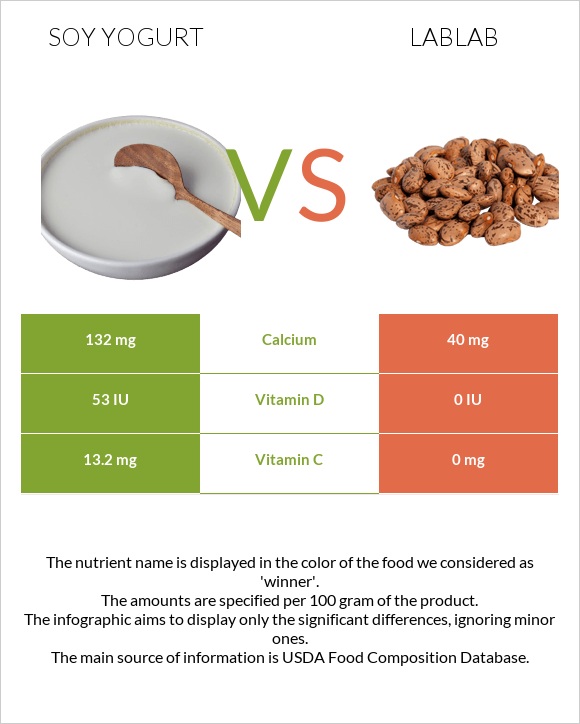Soy yogurt vs. Lablab — In-Depth Nutrition Comparison
Compare
Significant differences between soy yogurt and lablab
- The amount of vitamin C, calcium, and vitamin D in soy yogurt is higher than in lablab.
- Soy yogurt covers your daily vitamin C needs 15% more than lablab.
Specific food types used in this comparison are SILK Plain soy yogurt and Hyacinth beans, mature seeds, cooked, boiled, without salt.
Infographic

Infographic link
Mineral Comparison
Mineral comparison score is based on the number of minerals by which one or the other food is richer. The "coverage" charts below show how much of the daily needs can be covered by 300 grams of the food.
| Contains more CalciumCalcium | +230% |
| Contains less SodiumSodium | -46.2% |
Vitamin Comparison
Vitamin comparison score is based on the number of vitamins by which one or the other food is richer. The "coverage" charts below show how much of the daily needs can be covered by 300 grams of the food.
| Contains more Vitamin CVitamin C | +∞% |
| Contains more Vitamin DVitamin D | +∞% |
All nutrients comparison - raw data values
| Nutrient |  |
 |
DV% diff. |
| Iron | 4.58mg | 57% | |
| Copper | 0.341mg | 38% | |
| Zinc | 2.85mg | 26% | |
| Vitamin B1 | 0.27mg | 23% | |
| Manganese | 0.482mg | 21% | |
| Magnesium | 82mg | 20% | |
| Phosphorus | 120mg | 17% | |
| Vitamin C | 13.2mg | 0mg | 15% |
| Protein | 2.64g | 8.14g | 11% |
| Potassium | 337mg | 10% | |
| Calcium | 132mg | 40mg | 9% |
| Vitamin D | 53 IU | 0 IU | 7% |
| Vitamin D | 1.3µg | 0µg | 7% |
| Vitamin B5 | 0.316mg | 6% | |
| Selenium | 2.8µg | 5% | |
| Carbs | 9.69g | 20.69g | 4% |
| Calories | 66kcal | 117kcal | 3% |
| Vitamin B2 | 0.037mg | 3% | |
| Vitamin B3 | 0.411mg | 3% | |
| Vitamin B6 | 0.037mg | 3% | |
| Fats | 1.76g | 0.58g | 2% |
| Fiber | 0.4g | 2% | |
| Polyunsaturated fat | 0.245g | 2% | |
| Folate | 4µg | 1% | |
| Saturated fat | 0.22g | 0.099g | 1% |
| Net carbs | 9.29g | 20.69g | N/A |
| Sugar | 5.29g | N/A | |
| Sodium | 13mg | 7mg | 0% |
| Monounsaturated fat | 0.026g | 0% | |
| Tryptophan | 0.068mg | 0% | |
| Threonine | 0.315mg | 0% | |
| Isoleucine | 0.39mg | 0% | |
| Leucine | 0.691mg | 0% | |
| Lysine | 0.556mg | 0% | |
| Methionine | 0.065mg | 0% | |
| Phenylalanine | 0.41mg | 0% | |
| Valine | 0.422mg | 0% | |
| Histidine | 0.233mg | 0% |
Macronutrient Comparison
Macronutrient breakdown side-by-side comparison
Protein:
2.64 g
Fats:
1.76 g
Carbs:
9.69 g
Water:
84.67 g
Other:
1.24 g
Protein:
8.14 g
Fats:
0.58 g
Carbs:
20.69 g
Water:
69.13 g
Other:
1.46 g
| Contains more FatsFats | +203.4% |
| Contains more WaterWater | +22.5% |
| Contains more ProteinProtein | +208.3% |
| Contains more CarbsCarbs | +113.5% |
| Contains more OtherOther | +17.7% |
Fat Type Comparison
Fat type breakdown side-by-side comparison
Saturated fat:
Sat. Fat
0.22 g
Monounsaturated fat:
Mono. Fat
0 g
Polyunsaturated fat:
Poly. Fat
0 g
Saturated fat:
Sat. Fat
0.099 g
Monounsaturated fat:
Mono. Fat
0.026 g
Polyunsaturated fat:
Poly. Fat
0.245 g
| Contains less Sat. FatSaturated fat | -55% |





